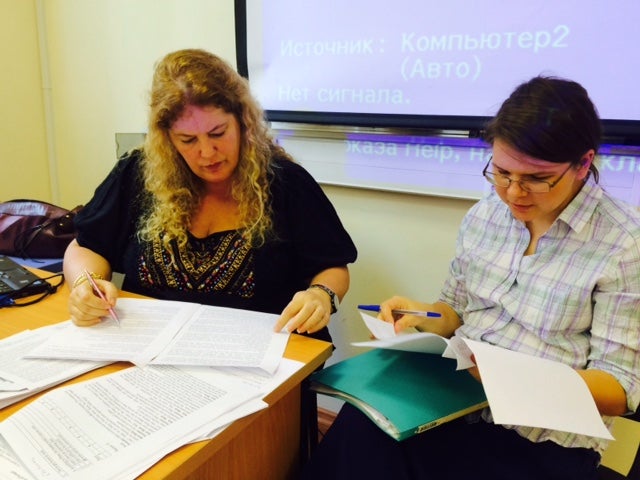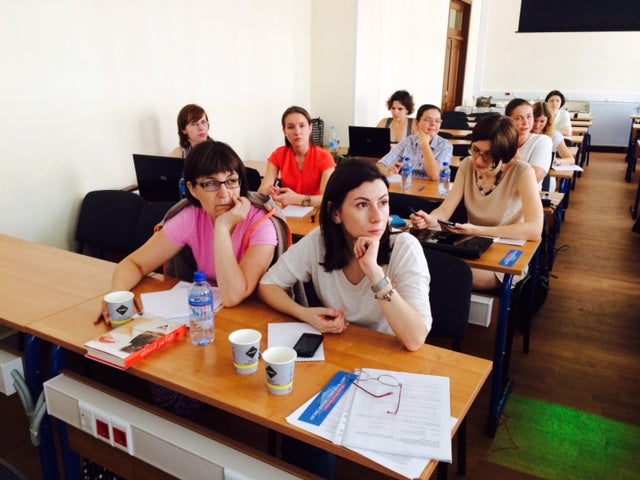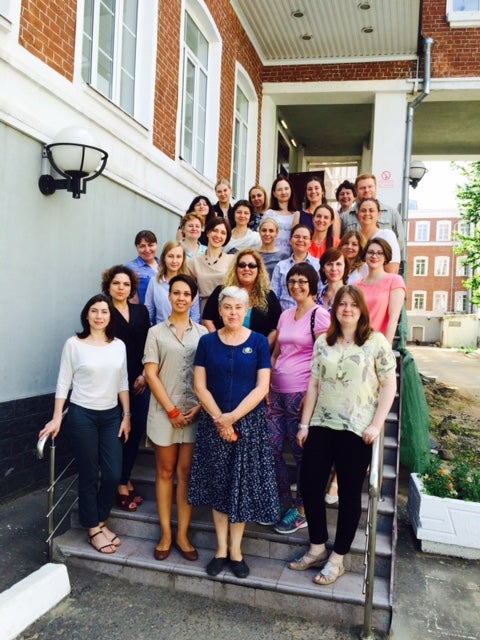It’s rare in the field of testing to have the opportunity to be involved with such a huge, impactful initiative for that long.”
When Dr. Christine Coombe starts talking about language assessment, her commitment to the field is
palpable. No surprise, given that testing has been the focus of her career since the first semester of her
doctoral program in Foreign and Second Language Education. Receiving a perfect score on the midterm
of her first-ever assessment course, Coombe was encouraged by the professor to write her dissertation
on the subject. “He told me I had a talent for refining and honing knowledge about assessment,” recalls
Coombe. “In short, I grasped it immediately.” Since then, she has amassed an impressive roster of
credentials in the field, including extensive awards in academic excellence, leadership roles in
professional associations, editorial positions on a vast array of educational journals, and authorship of
numerous assessment literacy textbooks and papers. But among this impressive list of accomplishments,
her assessment assignments as an English Language Specialist – in Africa, Asia, Europe, and South
America – hold a unique place, led by one tour-de-force assessment project, the likes of which Coombe
had never before experienced.

From 2003 to 2017, Coombe took part in a massive undertaking in Russia, working with educators across
that country to conceptualize and design the English language portion of that country’s first Unified State
Exam (known in Russia as the EGE). “I thought they were crazy to attempt this,” says Coombe. “How can
a country with a 10-hour time difference between east and west, with all those vastly different regions
in between, develop a nationalized test? The United States doesn’t even have one!” But that was the
task at hand, and, working in conjunction with the chairperson of Russia’s Federal Commission on the
EGE, Coombe tackled the assignment with her usual zeal for assessment, exhilarated by the prospect of
working on a project of such scope. “They had this idea, and I said, ‘Let’s get started.’” While the EGE
was officially launched in Russia in 2009 – and continues as a work in progress – Coombe returned
regularly over the years, seven visits total, working with educators there to fine-tune the exam, revising,
adding, and eliminating items when necessary. “It’s rare in the field of testing to have the opportunity
to be involved with such a huge, impactful initiative for that long,” notes Coombe.
The long journey to the EGE rollout started with her initial assignments in Russia, during which Coombe
not only helped participants conceptualize the English portion of the assessment but also addressed the
fundamentals, reviewing the cornerstones of good testing and guidelines for writing test items. “Testing
is one of those fields where every educator can use a review,” says Coombe. “If assessment developers
don’t apply those basic guiding principles, nothing produced will be worth much.” Participants consisted
of a core trio of educators from universities and the Ministry of Education, and a rotating group of about
20 test item writers – all teachers trained in assessment – from regions across Russia. “I insisted that
those involved be teachers, from experienced to novice,” says Coombe. “After all, they’re the ones in
the trenches who know what students – the most important stakeholders in this process – need.”

During subsequent visits, it was time to undertake the business of writing the assessment. In its first
incarnations, the EGE was to focus on reading, writing, vocabulary, and grammar, a tall order even
without the listening and speaking components that were to be added in future years. To accomplish
this monumental task, Coombe and her assessment team participated over the next decade in intensive
week-long summer institutes held in locations throughout Russia – a mountain retreat in Chelyabinsk, a
sanatorium in Kazan, an inn in the country town of Suzdal, a vocational college in Vladivostok – where
everyone involved developed a deep sense of camaraderie. “Participants were so excited to be part of
creating their country’s first national exam,” says Coombe. “They brought a unique energy and focus to
those workshops – I’ve never worked with such motivated individuals.” During those programs, Coombe
typically spent the first few hours of each day exploring various aspects of assessment literacy with
participants. For the remainder of the day, they worked in groups to peer review EGE test items, focusing
on potential questions to add to the EGE question pool. Coombe recalls that participants were so intent
on getting those items right, they’d often reconvene after dinner to work. “But even when they’d take a
spa break or a walk in the countryside, they’d still talk about multiple choice questions,” she says. The
final session of each institute typically consisted of one-on-one consultations with Coombe, who
provided feedback on test items. “My message to them was always, test what you teach and how you
teach it! That’s the most important aspect of assessment development. The content of a test should not
be a surprise to anyone involved – the focus has to be on transparency.”

Development of the English language assessment for the EGE was not without its frustrations for
Coombe. Typically, assessment reform follows curricular changes, but in this situation, it happened the
other way around in what Coombe saw as the classic situation of the tail wagging the dog. But she is
hopeful that this massive change to the assessment process will galvanize Russia to update its English
language curriculum and, given the scope of the project, she considers it a minor issue. “The EGE stands
as one of the most successful, home-grown national tests out there,” says Coombe. “I’m so proud that I
was there to witness such an impressive achievement.”
Christine Coombe has a Ph.D. in Foreign/Second Language Education from The Ohio State University. She is currently Associate Professor of General Studies at Dubai Men’s College in the United Arab Emirates. Christine is the author/editor of numerous books on assessment, leadership, TBLT, teacher evaluation/effectiveness, research methods, and professionalism in ELT. Dr. Coombe has lived and worked in the Gulf for the past 27 years. In this capacity, she has served as the President and Conference Chair of TESOL Arabia. Christine served as TESOL International Association President (2011-2012). Her most recent honor was being named to TESOL’s 50@50 which “recognizes professionals who have made significant contributions to the TESOL profession within the past 50 years.” Dr. Coombe is the 2018 recipient of the James E. Alatis Award which recognizes exemplary service to TESOL.

